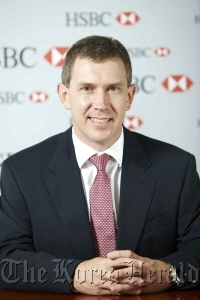Royal Bank of Scotland also faces sanction from financial regulator
Financial regulators have taken punitive actions against two European bank branches for their irregular trading of derivatives and plan to reprimand another Europe-based bank operating in Seoul.
In a statement Tuesday, the Financial Supervisory Service said it has issued a warning against the Seoul branch of HSBC Holdings plc and Credit Agricole S.A. for violating the capital market laws.
Noting that the Seoul branch of the Royal Bank of Scotland Group plc ― called RBS Bank ― also breached the laws in its trading of currency derivatives, the FSS said it is considering sanctioning the rule-violator.
“Between April 2007 and November 2009, RBS Bank engaged in the practice 142 times, amounting to $443 million (456 billion won),” the FSS said.
“We’ve found that several foreign bank branches relocated day-to-day trading operations involving their money to regional headquarters such as Hong Kong and Singapore,” an FSS official said at a news briefing.
 |
HSBC Korea CEO Matthew Deakin |
He alleged that the banks conducted the illegitimate practices as they sought to manage their entire Asian portfolio.
“Bigger banks’ trading on a regional level could have a significant impact on the local financial markets as such practices may lead to sharp changes to the portfolios of the banks’ local branches,” he said.
The FSS, in coordination with the Bank of Korea, has conducted an extensive inquiry into foreign banks operating in Korea since last year in a bid to boost currency market stability.
Several investment banks’ excessive capital flows have often been cited as the main factor stirring the foreign exchange market.
According to regulatory officials, banks’ short-term foreign bonds have continued to increase since last December and shot up by more than $5 billion in March alone.
“It is tentatively estimated that the growth in foreign bonds in the first quarter surpassed $10 billion,” an FSS official said. “Such rapid growth needs to be observed, because it can serve as a risky factor that can undermine the stability of the country’s financial market.”
Under its ongoing willingness to weed out illegitimate trading, the FSS plans to step up inspections into local branches, including an examination on the capital management of the 14 largest investment banks, whose derivatives balance exceeds 100 trillion won.
The financial watchdog also said it would expand its joint probe with the central bank into banks’ currency forward trading if necessary.
By Kim Yon-se (
kys@heraldcorp.com)








